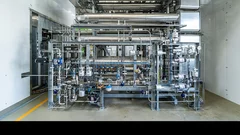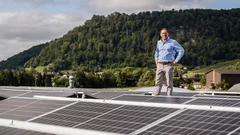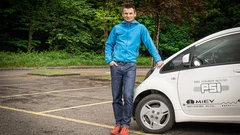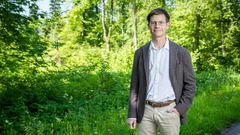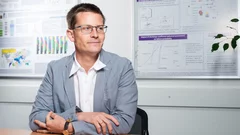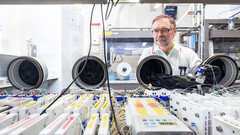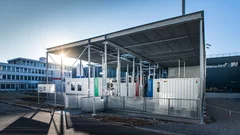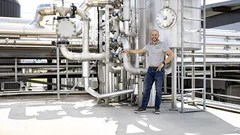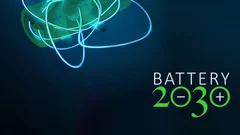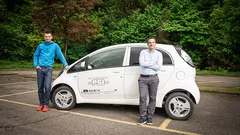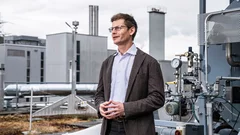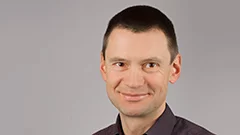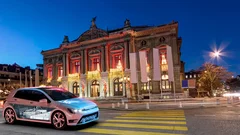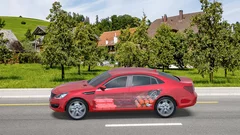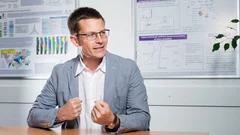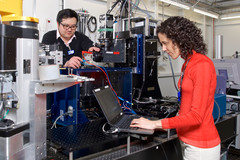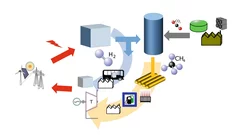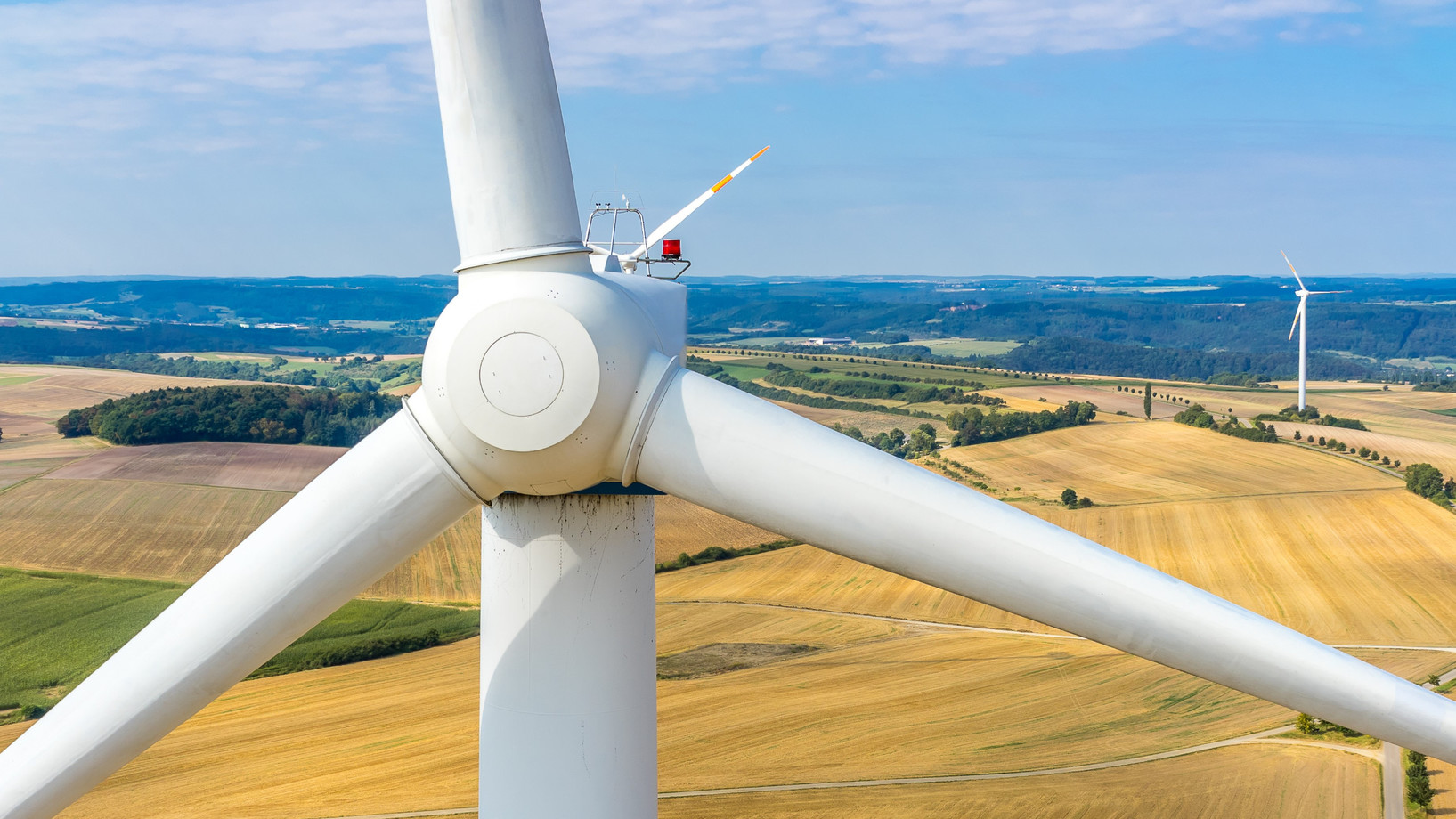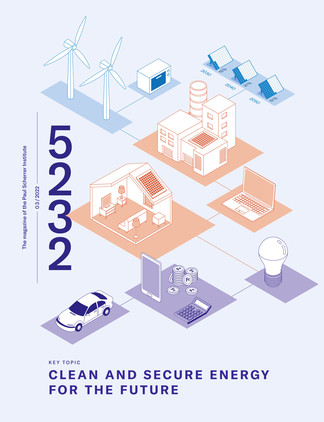Energy transition
Shifting away from nuclear energy, expanding solar and wind power, generating energy from biomass, reducing energy consumption. Switzerland is committed to becoming climate-neutral by 2050. An ambitious goal, which has become more urgent than ever due to the increasingly challenging geopolitical situation. How can a sustainable and resilient energy supply for Switzerland be established over the coming years? What's the optimal way to use renewable energy sources? What new technologies are especially promising? At PSI, researchers are seeking answers to these crucial questions.
Carbon dioxide can be turned into a valuable resource
New study explores methods for using waste gas efficiently.
Getting maximum energy out of biomass
Researchers at the Paul Scherrer Institute PSI start operation of a revolutionary pilot plant for production of synthetic biogas.
Where will the electricity come from in 2050?
Net-zero goal for CO2 emissions is technically achievable.
Effectively removing CO2 from the atmosphere
With careful planning, effective CO2 capture is technically possible.
“Without these technologies, we will hardly achieve our climate targets”
To achieve carbon neutrality, technologies need to be deployed which remove carbon dioxide from the atmosphere.
Improving the resilience of Switzerland’s energy supply
The SURE research project is up and running.
Safely stored for a million years
Switzerland plans to construct a deep repository for its radioactive waste. There are three potential locations, and data obtained by PSI researchers can aid in selection of the best one.
Switzerland's energy transition
Can Switzerland, as planned, reduce its CO2 emissions to zero by 2050? What is needed to achieve this? What could it cost?
Green fuels for aviation
In a new initiative, PSI and Empa want to jointly develop a process for producing kerosene from renewable resources.
Foundations for the energy system of tomorrow
On the way to a sustainable energy system, technologies that help to flexibly convert and efficiently store energy are becoming increasingly important. ReMaP, a novel research platform, aims to investigate these urgent issues under realistic conditions.
Clean biogas for a successful energy transition
PSI researchers have set up camp at a biogas plant near Lucerne. Between meadows and gigantic fermenters, they are investigating how they can remove impurities from the biogas to make this energy source even more usable.
BATTERY 2030+ – large-scale European initiative for battery research starts up
Future batteries need to store more energy, have longer life, and be safer and more environmentally friendly than today's batteries. The European initiative BATTERY 2030+, in which PSI is participating, is intended to help achieve these goals.
Life cycle assessment of cars – new web tool helps consumers and researchers
Decision support for car buyers: Researchers at the Paul Scherrer Institute have developed a web tool called the Carculator that can be used to compare the environmental performance of passenger cars in detail.
Long-term developments of energy pricing and consumption in industry
Researchers from the Paul Scherrer Institute PSI, on behalf of a research project funded by the Swiss Federal Office of Energy (SFOE), have studied how energy consumption by Swiss industry develops depending on energy prices. One result: Price increases for energy usually affect energy consumption only over the long term.
"Electric is already the right choice today"
An interview on automotive power systems with Christian Bauer, a scientist at PSI's Laboratory for Energy Systems Analysis who specialises in life cycle and sustainability analyses.
Make way for electric cars
Petrol, diesel, fuel cell or electric – which is the automobile of the future? A PSI study has examined the overall climate impact of various vehicle engines in use today and also projected it to the year 2040.
Toward better motors with X-ray light
Making Switzerland's road traffic fit for the future calls for research, first and foremost. In the large-scale research facilities of PSI, chemists and engineers are investigating how to improve the efficiency of motors and reduce their emissions.
"This is incredibly ambitious"
Every three years, the World Energy Council explores possible developments of the global energy system under different scenarios. Tom Kober, head of the Energy Economics Group in PSI’s Laboratory for Energy Systems Analysis and one of the lead authors of the study, explains what the individual scenarios mean and how global warming could be mitigated.
Observing solid-state batteries during deformation
PSI researchers have observed mechanical processes in solid-state batteries with unprecedented precision. Using X-ray tomography at the Swiss Light Source SLS, they discovered how fissures inside the batteries propagate. These insights can help to make batteries for electric cars or smartphones safer and more efficient.
The energy system of the future and Power-to-X
Researchers at the Paul Scherrer Institute PSI analyse the potential of Power-to-X for Switzerland's energy supply and present their conclusions in a white paper. One finding: The costs for energy from Power-to-X could fall by up to one-third.

